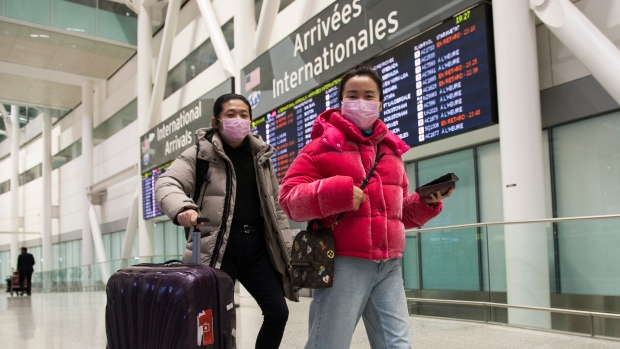Residents across the Greater Toronto Area are expressing concern after learning that a man in a Toronto hospital has been diagnosed with Canada’s first presumptive case of coronavirus.
Health officials confirmed the first “presumptive positive” case of coronavirus, known as 2019-nCoV, at Sunnybrook Hospital on Saturday. The patient, a man in his 50s, had recently travelled to Wuhan, China and returned to Toronto on Jan. 22.
He was admitted to the hospital the following day, where he remains in stable condition.
After hearing the news, some GTA schools issued notices to parents calling for caution and asking families to stay home if necessary.
The principal of Somerset Academy, a private school in Markham, sent a letter home to parents this weekend saying that families who have travelled to Asia should stay home for a minimum of 15 days.
“To avoid any member of our Somerset Academy family from getting sick with this illness, we are asking that all families who are currently away from school and are in Asia or are planning to go to Asia,to understand that you will not be permitted back into Somerset Academy or Yips until you and your family have been home from your travels a minimum of 15 days from the date you have landed back in Canada,” the letter reads.
“As proof of this, you will be asked to provide and show us your boarding pass(es) and/or stamped documents that states the date of your return from your trip.”
The letter urged parents of children with flu-like symptoms that have developed within the last 12 hours to stay home and rest.
“We are taking this illness, along with other sicknesses, very seriously and no exceptions or excuses will be accepted,” the letter said. “The health of our families is extremely important to us and you are only putting our students, along with our teachers and staff, health at risk. It is better to be safer now than sorry later.”
More than 6,000 people sign online petition in York
A petition has also started to circulate titled “stop the potential spreading of the novel coronavirus in schools of York Region.”
The author of the petition claims to be representing parents from various schools and calls for caution following Saturday’s Chinese New Year.
“Traditionally large amounts of people travel nationwide or even internationally during this period to meet families and friends, which tremendously increases the chance of infection,” the petition said.
“Meanwhile, in the next few weeks, families went to China will travel back to Canada. It will definitely bring the virus into our country, and makes next two to four weeks being the peak time of this infectious disease transmission.”
The petition recommends that schools keep track of students who recently travelled to China and asks those families to stay isolated for a minimum of 17 days.
Meanwhile, Infectious Disease Expert Dr. Neil Rau said that people need to listen to world health experts and stop creating an “epidemic of fear.”
“We don’t need people going rogue, deciding to do their own form of quarantine where they tell people to stay home for two weeks after they came back from China,” he told CTV News Toronto. “No one is telling anyone to do that at this time. It is incredibly disruptive, it has economic consequences, it is inconvenient for parents, it’s bad for kids’ education if schools do this.”
The last statement released by the Toronto District School Board about the coronavirus was on Jan. 24.
Toronto public health urging people to contact officials
In a statement released Sunday afternoon, Toronto’s Medical Officer of Health said that officials are “actively following up” with anyone who may have been on China Southern Airlines flight CZ311, which arrived at Pearson airport on Jan. 22 from Guangzhou.
“We are informing these people that they may have been exposed to a potential health risk, what signs and symptoms they should look out for, and when and what type of medical treatment should be sought out, if that becomes necessary,” Dr. Eileen de Villa said in a statement said. “This work is part of routine public health follow-up of a case of an infectious disease.”
De Villa also said that local hospitals have reported that people are coming to emergency departments without symptoms of the virus.
“While we appreciate that people may have concerns, and that people may worry about their health, we encourage people who were on this flight and who do not have signs of illness to continue with their routine activities and we ask that these people do not present to the healthcare system,” she said.
“The risk to our community remains low.”
The illness was first reported in Wuhan, China in late December. As of Sunday, there were nearly 2,000 diagnosed cases around the world.
More than 55 people have died as a result of the virus in China.
Markham mayor calls for enhanced screening at airports
Markham Mayor Frank Scarpitti released a statement Sunday evening calling on the federal government to implement additional screening and detection measures at Canadian airports.
“The current measures introduced are less stringent than at other major airports in New York City, San Francisco and Los Angeles that involve passengers from China being screened for symptoms,” he said.
“With a first presumptive confirmed case of the novel coronavirus now in the Toronto area, there is heightened concern and anxiety in the community. These screening measures as an ounce of prevention would provide greater public confidence that more is being done to reduce risk and exposure to the virus.”
Earlier this month, major airports in Toronto, Vancouver and Montreal increased security measures as a result of the coronavirus. An additional health screening question was also added to electronic custom kiosks.
Travellers are also being asked to inform border services officers if they are experiencing flu-like symptoms.
With files from CTV News Toronto’s Janice Golding

























